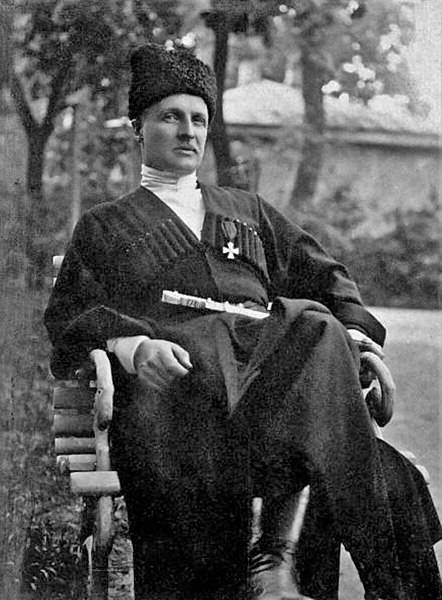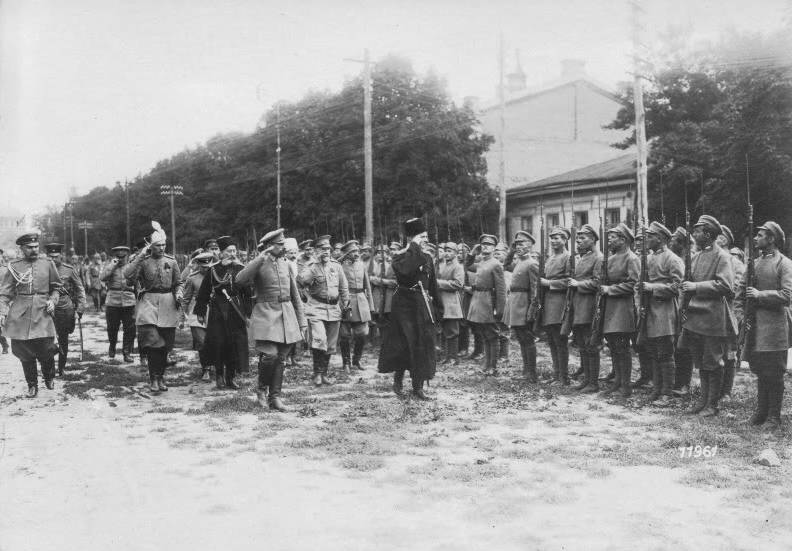"Vulgar operetta" by Skoropadsky

Ukrainian operetta
The fact that the Central Rada, and then the Hetmanate and the Directory were an operetta, a circus during their existence, was written not only by Russians and Germans, but by the “Ukrainophiles” themselves (representatives of the South Russian intelligentsia, which diligently formed the Ukrainian myth, most often by Western order) .
The Ukrainian leaders who created the state project "Ukraine" - Grushevsky, Vinnichenko, Petlyura, Doroshenko and others, initially created a chimera. They were historians, publicists, poets, journalists, lawyers, they craved fame, popularity. But they were not statesmen, managers. They considered the creation of "Ukraine" as a theatrical production. Hence the bright names. The “Ukrainian army”, descended from theatrical productions, with sedentary people on shaved heads, haidamaks with curved sabers and huge daggers (the real ones were in short supply, so they hung fake ones), prancing on white horses. Lush prayers, parades, processions and so on, all in the spirit of mass cultural productions.
The whole essence of this Ukrainian operetta was well expressed by Hetman Skoropadsky in his memoirs: “The entire generation of current Ukrainian leaders was brought up in the theater, from where came the love for all theatricality and passion not so much for the essence of the matter as for its external form. For example, many Ukrainians really believed that by declaring an independent Ukraine in the Central Rada, the Ukrainian state becomes an absolute fact. For them, the Ukrainian sign was already something that they considered unshakable.”
In fact, the Central Rada was just a theater, a gathering of talkers who had no real power. The people of Kiev and other townspeople quickly understood this. The peasants were not worried about politics, not empty chatter, not the language and form of the newly minted haidamaks, but specific questions of land ownership and the redistribution of land. The workers were for various socialists, Bolsheviks.
At the same time, a criminal revolution was taking place, in troubled times, a variety of fathers and chieftains bred. Therefore, the Rada instantly lost the war to the Reds (How the Bolsheviks liberated Russian Ukraine for the first time), which at that moment had minimal forces and resources. And then the Germans came and put things in order ("Foreigners will help us!" How the Rada sold the Russian Ukraine to the Germans; Part 2).
The Germans quickly understood what the Central Rada was. The Ukrainian authorities verbally agreed with the Germans in everything, being afraid of them, but in fact they gave instructions to officials to slow down and sabotage. The Germans had to take by force the resources they were promised. The people were indignant, resistance began, a partisan movement. The economy was rapidly falling apart and degraded to barter.
In the field of Ukrainian culture, about which there was so much shouting, nothing was done. The Rada did not open a single Ukrainian educational institution, except for the Ukrainian People's University, where, as usual, they only rallied and chatted, and did not study. Yes, and all lectures were given in Russian, since a terrible mixture of South Russian dialects (mova), Polish and simply invented words - the so-called. "Ukrainian", in fact, no one knew. All Ukrainian culture was expressed in the elements of "folk Ukrainian" clothing, huge daggers of Haidamaks and settlers.
Hetmanate
It is clear that in the current situation, the German occupation command decided to replace the Rada with a more effective native government (How the Germans changed the sign on the map of the southern provinces of Russia). On April 28, 1918, a German patrol entered the hall of the Pedagogical Museum, where the Central Rada met, arrested the ministers Lyubinsky and Gaevsky (Ministry of Foreign Affairs and the Ministry of Internal Affairs), and searched the deputies, copied them and dispersed them to their homes. There was no resistance, since the Rada did not have any support among the people.
In return, Field Marshal Eichhorn decided to give the "Ukraine" a hetman (hauptman - chief). The day after the dissolution of the Rada in the circus building (very symbolically), the congress of Ukrainian "grain growers" (landowners) proclaimed Pavlo Petrovich Skoropadsky as Hetman of Ukraine. He belonged to one of the noblest and richest families of Little Russia. His ancestor, Ivan Skoropadsky, was already a Little Russian hetman at the beginning of the 34th century. He was a member of the retinue of Emperor Nicholas II. During the First World War, he commanded the XNUMXth Army Corps, which, after the February Revolution, they tried to Ukrainize.
On April 13, 1918, in a telegram to Eichhorn, the German Kaiser Wilhelm II stated:
Thus began a short era of the new Hetmanate, as the people of Kiev themselves called it, "hetmanshaft." The hetman settled in the house of the Kyiv governor-general. Above the hetman's office on the second floor was the premises of the German guard. In essence, the power of Skoropadsky stood only on German bayonets. That is, the signboard has changed, but the theater, the circus has remained.
Ukrainian state
The hetman was a kind of monarch, he himself appointed and dismissed ministers, issued laws and monitored their implementation. Supporters of order were its support: officials, officers, large landowners, owners of factories, factories, banks, newspapers and steamships.
A new army was created: a separate Serdyuk division was recruited to guard the hetman, a division in Kharkov, several guard and border hundreds. In Vladimir-Volynsky, the Austrians formed the 1st Streltsy-Cossack division from Russian prisoners of war who lived in Little Russia. They were called "grey-sleeves" - according to the color of the upper uniform (like a jacket - the so-called zhupana), sewn from gray cloth, which in the more eastern and northern territories of the Russian Empire was called "zipun". The Austrians were engaged in the formation and military training of the "gray-skins".
In July 1918, the Council of Ministers of the Ukrainian State adopted a law on universal military service and approved a plan for organizing the army, prepared by the General Staff. According to the territorial principle, 8 infantry corps were created. There was also a Separate Corps of the Marine Guard (Coast Guard) and a Separate Corps of the Border Guard. It is worth noting that the new "Ukrainian" army, in addition to symbols, was completely Russian in its command and rank and file composition. Since "Ukrainians" at that time were only politicians and Ukrainian intellectuals.
In general, "Ukraine" at this time becomes a place of attraction for all those fleeing the Bolsheviks from Petrograd, Moscow, and other large cities and regions of Russia. By the summer of 1918, at least a third of all Russian officers were in Little Russia and Novorossia. Skoropadsky allowed the formation of detachments of white officers.
The Cossacks were granted a special status, the documents used the appeal “citizens and Cossacks”, for them it was supposed to allocate separate territories in the Zaporozhye region for Cossack settlements. True, they did not manage to create a new Zaporizhzhya army.
The policy of Ukrainianization continued. The government recognized the Ukrainian language as the state language and obliged to translate the work of all institutions and the army into it. Announcements at railway stations, the work of the post and telegraph, teaching in schools and universities - all spheres of public life were ordered to be translated from Russian into Ukrainian. True, all this was so far only formal, it was impossible to instantly remake the Russian "Ukraine" into the "Ukrainian State". The production of Ukrainian-language books and newspapers increased, Ukrainian universities were opened in Kyiv and Kamenetz-Podolsky, the Faculty of History and Philology in Poltava, the State Ukrainian Archive, the National Gallery of Arts, Ukrainian historical museum, the National Library of the Ukrainian State, the Ukrainian Drama and Opera Theatre, the Academy of Sciences, etc.
In the economy and the social sphere, the government canceled all socialist transformations: the length of the working day at industrial enterprises was increased to 12 hours, strikes and strikes were prohibited. The State and Land banks were created, the work of the railways was restored. But in general, the industry continued to degrade.
The land policy of the Rada was abolished, and stakes were placed on the restoration of large landlord and middle peasant farms. The state grain monopoly was maintained in the interests of Germany and Austria-Hungary. A significant part of the harvest collected by the peasants was subject to requisition, and a tax in kind was introduced. Naturally, this provoked the resistance of the peasantry.
The occupying German-Austrian troops took the most decisive measures to restore their order. The landowners were given back land, livestock and equipment. The landlords put things in order in their lands. The punitive detachments burned the villages, carried out mass executions. But this only embittered the Russian Little Russians.
The activity of various gangs - from simple criminal to ideological ones, is increasing dramatically. The real peasant war begins. The peasants organize themselves and wage a struggle against the landowners, officials, the authorities in general, and the German-Austrian occupiers. Peasant uprisings practically disrupt the food policy of the occupation authorities.
At this time, the real army of Old Man Makhno was being formed, which operated on a vast territory from Lozovaya to Berdyansk, Mariupol and Taganrog and from Lugansk to Yekaterinoslav, Aleksandrovsk and Melitopol. The bands of Zeleny, Struk, Sokolovsky, Tyutyunnik, Marusya and others were also very popular.

Pavel Skoropadsky at the review of the Serozhupan division, accompanied by German officers. August 1918
To be continued ...
Information